Ibizan Hounds are large dogs. Males weigh around 50 pounds and stand 22 to 29 inches tall, while females weigh around 45 pounds.
Ibizan Hound
Breed Type: Hound
Common nicknames: Ibizan Warren Hound, Balearic Dog, Beezer
Coat: Wiry, smooth
Hypoallergenic: No, they will likely trigger allergies.
Temperament: Gentle, affectionate, playful, energetic
Life expectancy: 11-14 years
Color & patterns: Red and white

Originating from the island of Ibiza in Spain, the Ibizan Hound’s history dates back thousands of years. They were highly prized for their exceptional hunting skills and ability to navigate challenging terrains with their agile grace. With their sleek build and beautiful almond-shaped eyes, these dogs are also as stunning as they fast — their speed and endurance make them exceptional hunters and competitors in various dog sports. In addition to being athletic, Ibizan Hounds are gentle and affectionate and form strong bonds with their families. So, if you’re looking for a devoted and active pup, the Ibizan Hound is sure to fill your days with good times.
Ibizan Hound characteristics
Learn about about Ibizan Hound basics like their fur colors, shedding levels, how much grooming they need, and other Ibizan Hound facts.
Average height
22-29 inches (55.9-73.7cm)
Average weight
33-64 pounds (15.0-29.0 kg)
Average lifespan
11-14 years
Exercise needs
Grooming needs
Full-grown size
Good with cats
Good with kids
Training Aptitude
What colors do Ibizan Hounds come in?
Ibizan Hounds are shades of red and white in various pattern types, including solid red, solid white, and combinations of red and white.
Do Ibizan Hounds shed?
Yes, Ibizan Hounds shed moderately.
How long do Ibizan Hounds live?
Ibizan Hounds live 11 to 14 years. Like all breeds, their lifespan is influenced by factors such as genetics, diet, exercise, and overall health care. Regular veterinary check-ups and a healthy lifestyle can help ensure your Ibizan Hound lives a long, happy life.
When do Ibizan Hounds stop growing?
Ibizan Hounds stop growing at 12 to 18 months of age. They continue to fill out and gain muscle mass until they are about two years old. Regular exercise and a balanced diet will encourage healthy growth during their early development.
Ibizan Hound history
Learn about where this Ibizan Hound came from!
Where are Ibizan Hounds from?
Ibizan Hounds are from the Mediterranean island of Ibiza off the coast of Spain. Ancient Egyptian sculptures place the ancestors of this breed back to 2400 B.C.E. Phoenician traders spread this breed to the Balearic Islands off of Spain thousands of years ago, where they became the devoted companions of hunters.
How many types of Ibizan Hounds are there?
There are two types of Ibizan Hound: the smooth-haired variety and the wire-haired variety.
Are Ibizan hounds rare?
Yes, Ibizan Hounds are rare, especially outside their native Spain. While they have gained popularity as companion animals and show dogs, they’re not as common as Labs, Golden Retrievers, or other popular breeds commonly seen at the dog park.
Ibizan Hound temperament
Learn about about the Ibizan Hound temperament and how well they fit into your lifestyle, home environment, and family.
Do Ibizan hounds bark a lot?
No, Ibizan Hounds don’t bark a lot. These quiet dogs are most likely to bark to alert their families to new sights and sounds.
Are Ibizan Hounds good family dogs?
Yes, Ibizan Hounds are good family dogs. Affectionate and spirited, this athletic breed will be happiest with a family who loves to jog and stay active. Ibizan Hounds form loving, affectionate bonds with the people in their lives, but their families should be sure to keep them on-leash as this breed loves to run and chase, well, anything.
Are Ibizan Hounds easy to train?
Yes, Ibizan Hounds are relatively easy to train given their intelligence and eagerness to please. They do have a strong independent streak and can be stubborn, which can make training a challenge for a novice. Positive reinforcement, such as treats and praise, work best for motivating them, as well as keeping training sessions short. With consistency and patience, you’ll see great results training your Ibizan Hound. Also, keep in mind that even if a certain dog breed is known to be easy to train, training any dog requires a long-term commitment.
Are Ibizan hounds couch potatoes?
No, Ibizan Hounds aren’t couch potatoes. This active and energetic breed loves to run and play. While they can relax and enjoy downtime with their families, Ibizan Hounds thrive best in active households where they get plenty of physical and mental stimulation. Regular exercise is important to keep them happy and healthy.
Are Ibizan Hounds good with kids?
Yes, Ibizan Hounds are good with kids. Like most hounds, Ibizan Hounds are gentle, kind, and playful around children. As with any breed, It’s important for pet parents to teach their dogs how to gently interact with children and supervise all interactions with them to make sure everyone stays safe. It’s also crucial for parents to teach kids how to interact gently with all dog breeds and recognize when they need space.
Are Ibizan Hounds good with cats?
No, Ibizan Hounds aren’t a good fit with cats. Because Ibizan Hounds were bred as hunting dogs, they have a strong instinct to chase small, furry things, which is not the best for a cat roommate. But if an Ibizan Hound and cat are raised together, these two are more likely to peacefully coexist in the same household.
Ibizan Hound health
Learn about about the Ibizan Hound health outlook and what diseases they may be prone to at various stages of their life.
Do Ibizan Hounds have a lot of health problems?
No, Ibizan Hounds don’t have a lot of health problems. Like most primitive breeds, as well as most hounds, the Ibizan Hound is a robust breed free from most genetic disorders.
What diseases are Ibizan Hounds prone to?
Some diseases Ibizan Hounds may be prone to include:
Hip and/or elbow dysplasia: Hip and elbow dysplasia are two of the most common skeletal diseases seen in dogs. They are similar diseases in which either the hip or elbow joint has grown abnormally or is misshapen. The abnormal shape prevents the joints and sockets from adequately meeting one another, resulting in rubbing and grinding instead of sliding smoothly. Though the main complication with hip dysplasia is joint instability, the abnormalities present in elbow dysplasia often result in pieces of bone and/or cartilage breaking loose and irritating the joint tissues. Over time, the rubbing from dysplasia can cause a variety of issues, such as pain, lameness, and secondary osteoarthritis. Surgery can fix the joint if diagnosed before the onset of arthritis. If you are rescuing an Ibizan Hound, have them checked out by a vet to see if they are prone to dysplasia.
Eye issues: Progressive retinal atrophy (PRA), a progressive degenerative disease affecting the retina that eventually leads to blindness; cataracts, a common eye condition that causes cloudiness in the eye and obstructs vision; and retinal dysplasia, a painless malformation of the retina that can cause vision obstructions.
Axonal dystrophy: This is a rare neurological disorder that causes a progressive decline in nerve cell function. The brain’s nerve cells lose their ability to transmit to each other normally, which causes a loss of coordination. As the disease progresses, you will notice your dog may begin stumbling, experience head tremors, suffer from incontinence, and develop secondary pneumonia.
Others: Epilepsy, which is a seizure disorder; sensitivity to anesthesia; dental issues; and congenital deafness.
To identify some of these issues, a veterinarian may recommend hip, eye, and hearing tests for your dog.
Are Ibizan Hounds hypoallergenic?
No, Ibizan Hounds are not hypoallergenic. (No dog truly is!) Even with a short coat that doesn’t shed as much as some breeds, they still produce allergens through their skin, saliva, and urine. If you or someone in your household is concerned about allergies, spend time with an Ibizan Hound before making a decision.
Do you need to groom an Ibizan Hound?
Yes, you need to groom an Ibizan Hound, though their grooming needs are low-key compared to other dogs. The occasional brushing will keep shedding at bay and their coats looking healthy.
Find Ibizan Hound puppies near you
Adopting an Ibizan Hound
We don't see any Ibizan Hounds available for adoption in your exact location or cities near you, but here are some adorable similar breeds in Columbus, OH.
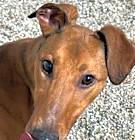
Pudge
Greyhound Hound (Unknown Type)
Female, 3 yrs 7 mos
Westerville, OH
Not good with dogs
Not good with cats
Spayed or Neutered
Shots are up-to-date
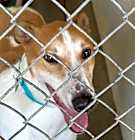
Woody
Greyhound Hound (Unknown Type)
Male, adult
Westerville, OH
Good with dogs
Not good with cats
Spayed or Neutered
Shots are up-to-date
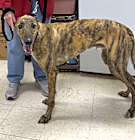
Reacher
Greyhound Hound (Unknown Type)
Male, 3 yrs 6 mos
Westerville, OH
Good with dogs
Not good with cats
Spayed or Neutered
Shots are up-to-date
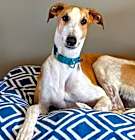
Pepper Jack
Greyhound Coonhound (Unknown Type)
Male, 2 yrs 6 mos
Westerville, OH
Good with dogs
Not good with cats
House-trained
Spayed or Neutered
Shots are up-to-date
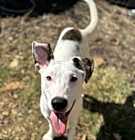
Peter
Greyhound
Male, young
New Albany, OH
Not good with dogs
Not good with cats
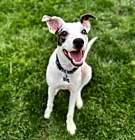
Meg
Greyhound
Female, young
New Albany, OH
Not good with dogs
Not good with cats

Pudge
Greyhound Hound (Unknown Type)
Female, 3 yrs 7 mos
Westerville, OH
Not good with dogs
Not good with cats
Spayed or Neutered
Shots are up-to-date

Woody
Greyhound Hound (Unknown Type)
Male, adult
Westerville, OH
Good with dogs
Not good with cats
Spayed or Neutered
Shots are up-to-date

Reacher
Greyhound Hound (Unknown Type)
Male, 3 yrs 6 mos
Westerville, OH
Good with dogs
Not good with cats
Spayed or Neutered
Shots are up-to-date

Pepper Jack
Greyhound Coonhound (Unknown Type)
Male, 2 yrs 6 mos
Westerville, OH
Good with dogs
Not good with cats
House-trained
Spayed or Neutered
Shots are up-to-date

Peter
Greyhound
Male, young
New Albany, OH
Not good with dogs
Not good with cats

Meg
Greyhound
Female, young
New Albany, OH
Not good with dogs
Not good with cats


